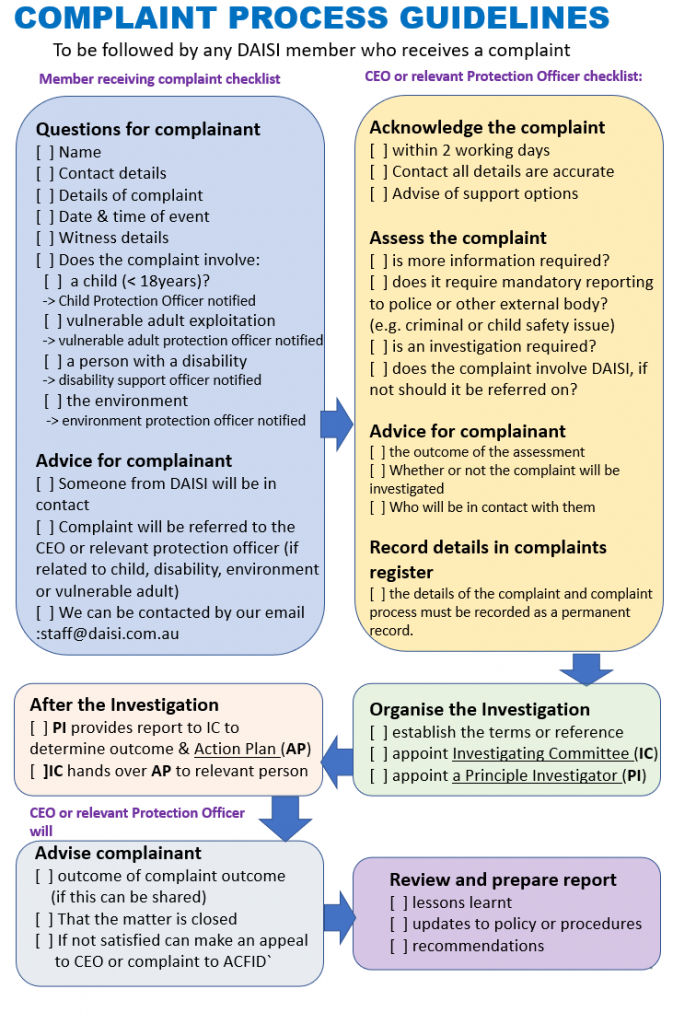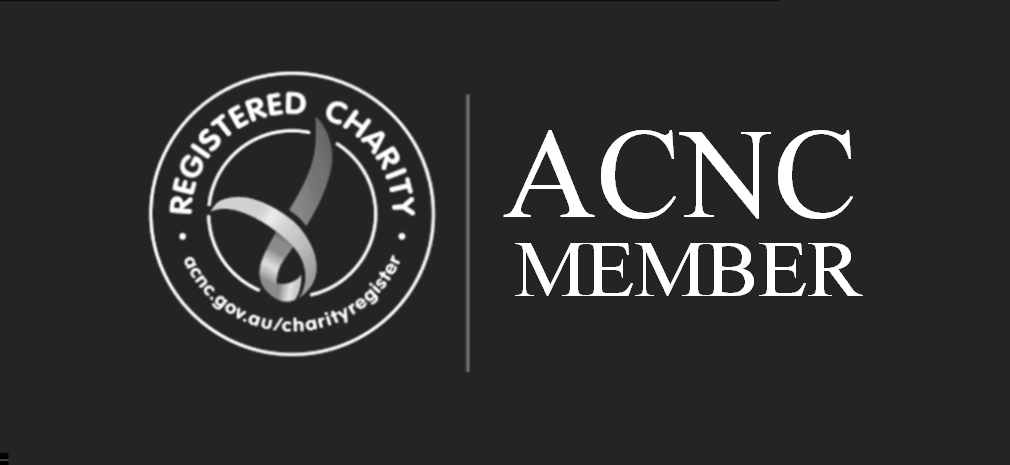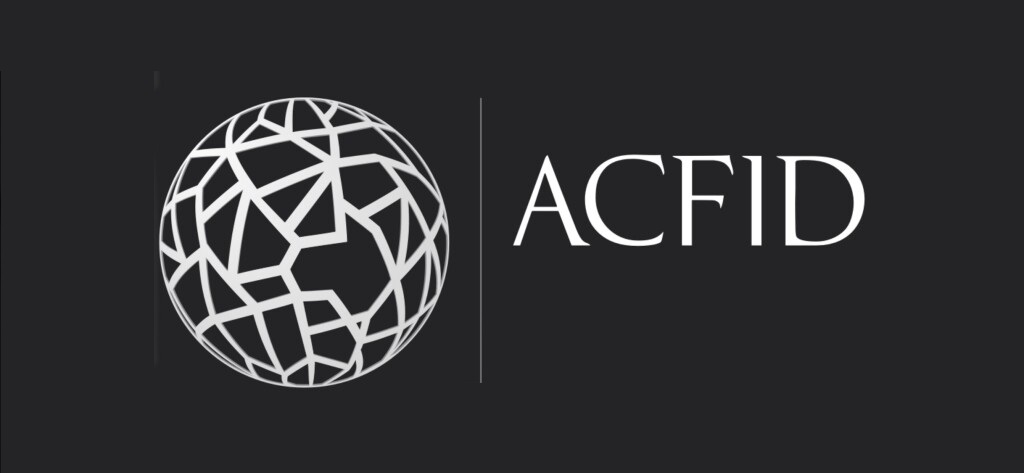.
This policy outlines DAISI’s approach to handling complaints including processes to respond to complaints, and protecting those who report wrongdoing
POLICIES
WHY WE ARE INTERESTED IN YOUR COMPLAINT ?
- Complaints assist us in identifying and responding to fraudulent, illegal or unethical conduct (including any sexual exploitation) in any of the environments we work. In this was DAISI is able to improve its operations. DAISI also has legal and regulatory obligations to listen to and act on complaints..
WHO CAN MADE A COMPLAINT?
- Anyone can make a complaint or express a concern.
- DAISI is committed to receiving complaints or concerns from anyone, especially those most vulnerable.
- Complaints can be made by anyone. This includes individuals or organisations in relation to any aspects of DAISI’s work
- This includes its operations here in Australia, as well as its international development work, and humanitarian responses.
WHO CAN COMPLAINTS BE MADE AGAINST
- Complaints can be made against
- People inside DAISI (Executive, Directors, Members and Volunteers)
- People outside the DAISI (including stakeholders, recipients, and partners).
- And anyone else not listed above who wishes to make a complaint or report
WHO CAN COMPLAINTS BE MADE TO?
- Complaints can be made to any DAISI employee, member, volunteer or partner can make a complaint to any DAISI employee. They may consult with their direct manager or may contact the Complaints Focal Person directly to get advice on the next steps. However, all sensitive or whistle blower complaints (including child protection, sexual exploitation, abuse or harassment or fraud) must be reported via staff@daisi.com.au.
- If you are a staff member and have a complaint about employment issues, you should first speak with your manager. If you feel your complaint is not being heard, it is appropriate to escalate it in line with this policy.
WHAT PROTECTION WILL I RECEIVE IF I MAKE A COMPLAINT?
Maintaining confidentiality
- If you feel afraid to speak up, there are things we can do to help protect you.
- We know people may feel safer to report a complaint if they know it will be treated confidentially. This means your identity (your name and other details) will not be shared, where possible and appropriate. Confidentiality means we share with the minimum number of people, and only with people who need to know. Exceptions to this, include mandatory reporting obligations, where police must be notified, and specifics of the complainant obtained.
- Whilst it is our aim always to protect your confidentiality, freedom of information laws in Australia sometimes allow court injunctions to forcibly obtain information against our will.
Providing a dignity and ease of access during the complaints process
- We endeavour to ensure that our complaints process is safe, and easily publicly accessible.
- We will ensure during the complaints process that you are managed in a safe and dignified manner. We will ensure that we can be contacted in multiple ways, and in a manner that does not unnecessarily inconvenience you. Examples include telephone, email, teleconference (e.g. ZOOM) and by mail. We work with our in-country employees and program partners to develop ways to make complaints that are safe, easily accessible, while being mindful of local contexts, culture and language.
Protecting the vulnerable
14. We are aware of needs of those who are vulnerable or may be victims/survivors of harm, and the potential effects that complaints may have on them. . We will provide you with information about how we handle complaints. We will: treat you with dignity and respect; actively involve you in decision making whilst aiming to protect privacy and confidentiality, and where we cant assist you, provide access other support services that may be required. We will take all reasonable steps to make sure that people making complaints, particularly if vulnerable persons, are not negatively affected because a complaint has been made by them. In the case of someone making a complaint on your behalf (for example, a family member speaking up instead of you), we will do our best to ensure that you, and that person, are not affected
Complete Impartiality
15. Each complaint will be handled with in a fair and non biased manner. This means that all parties, including the respondent, are treated in a fair and dignified way.
16. We will ensure that the person handling a complaint is different from any employee who is being complained about to avoid any bias or conflict of interest.
Timely response
17. DAISI aims to act in a timely manner to your complaint to provide a fair and considered response that is sensitive to the needs of those involved. An initial response should be received in 2 days. We will respond to complaints according to how urgent or serious they are. If somebody’s safety or security is at risk, we will respond immediately and will escalate appropriately. In most cases if an investigation is undertaken we will attempt to contact you with an outcome within 30 days
TYPES OF COMPLAINTS
18. Not all complaints are of the same nature or level of seriousness, and management of complaints will depend on its nature. There are broadly three categories of complaints:
19. A complaint from anyone who has observed, heard about or been directly affected by the actions of DAISI or our partners, or who believes that DAISI or its partners have failed to meet a specific commitment or obligation
General Complaints
- Examples of General complaints includes but is not limited to:
• Conflict of Interest issues
• Employment issues including complaints or concerns about:
• Funding and program decisions
• Fundraising and Supporter Services
• Program implementation
• Safety or security within the work environment
• Unethical behaviour associated with organisation changes
• Unfair or unjust employment conditions
Sensitive complaints
21. Complaint that needs to be treated urgently and confidentially by senior employees within the organisation. A sensitive complaint can be made by anyone who has observed, heard about or been directly affected by the actions of DAISI or its program partners. Sensitive complaints may include bullying and harassment between employees, or unlawful discrimination.
- Examples of Sensitive complaints includes but is not limited to:
- Abuse
- Bullying, harassment or discrimination between personnel
- Corruption
- Discrimination
- Exploitation
- Fraud
- Harassment
- Misuse of funds
- Misconduct negligence
- Theft
Whistle blowing complaints
23. Whistle blower complaints are complaints about wrongdoing such as fraud, corruption, abuse, misuse of resources, risk to health and safety etc. This may also be considered a sensitive complaint. DAISI has a separate policy on Whistleblowing.
Anonymous complaints
- Anonymous complaints are where the complainant does not reveal their identity, or if their identity is revealed, it is on the understanding that their identify will be kept confidential.
- We will investigate all anonymous complaints. While we may not be able to respond directly to the complainant, we may be able to use the complaint to alert us to matters that need to be investigated and/or referred to authorities.
26. Where practical and appropriate, we will protect the identity of complainants. Personal information that identifies individuals will only be disclosed when required by law. When required for purposes of the investigation or other related purposes, all reasonable efforts will be taken to de-identify information that is not required for the purpose of the disclosure. In some instances, it may not be possible for an investigation to progress if the existence of the report cannot be disclosed and a statement by the individual cannot be provided as evidence.
27. We understand that some complaints need to be kept confidential in order to protect those making or involved in the complaint. However, in some instances we might judge that the reporter will be better served if others are involved in the resolution of a complaint.
28. Third parties will only be included in the resolution of confidential complaints on a case-by-case basis and with the agreement of the complainant.
29. We will reduce the risk that a complainant will be identified by, for example, redacting records or de-identifying information about them, using gender-neutral language.
30. Despite our best intentions to keep complainants confidentiality, Australia’s freedom of information laws may require DAISI to release information if this is decided in a court of law.
HOW TO MAKE A COMPLAINT?
- 31. We recommend making all complaints directly to the DAISI CEO. This can be done by email (staff@daisi.com.au) or by phone (612 478 067 159), or by post (DAISI, PO Box 679, Crows News, NSW, 1585) or in person at our head office (Shop 1, 38 Pacific Hwy, St Leonards, NSW, 2065). Depending on the nature of your complaint it may also be allocated to a complaints focal person to deal (see below):
- Environment Protection Officer Ms Lyndall Dalley
- Child & Vulnerable Adult Protection Officer Ms Nili Hali
- Gender Protection Officer Ms Vasu Santhanam
- Disability Support Officer Ms Erina Yip.
- Alternately you can complete an online Whistle blower Incident Reporting Form, which will be passed onto the relevant Protection Officer.
- Environmental Protection Incident Reporting Form
- Sexual Exploitation Incident Reporting Form
- Gender Inequality Incident Reporting Form
- Vulnerable Adult Incident Reporting Form
- Child at Risk Incident Reporting Form
- Fraud or Terrorism Reporting Form
- Whistleblowing Hotline Reporting Form
CAN I APPEAL A DECISION?
- We want you to make sure the complaint is satisfactorily resolved. We encourage you to ask for clarification or feedback during the process. If, after having the opportunity for feedback, you do not feel satisfied with the outcome, you can submit a formal appeal via staff@daisi.com.au or call us on 0478 067 159 and your appeal will be considered by the DAISI Executive Committee and Board. You will be contacted by a representative of DAISI with updates and ultimately the outcome of the appeal.
PROCESS FOR REVIEWING AND ANALYSING EVERY COMPLAINT.
- Any DAISI staff member, volunteer, or partner who received a complaint should document the following
- Name and contact details of the person making the complain
- Details of the complaint or concern including date, location and people involved.
- Whether there is anyone in danger
- Your name and date your received the complaint.
WHAT TO ADVISE COMPLAINANT
- The complainant is to be advised that someone from DAISI will be in contact with them
- All complaints of a general nature will be passed on to the CEO
- If the complaint relates to child protection, vulnerable adults, gender inequality or environment protection that their complaint will be referred to the complaints focal point.
- All complaints can also be received in writing to staff@daisi.com.au
THE CEO OR COMPLAINTS FOCAL POINT RESPONSE
- The CEO (fore all general complaints) or Focal Point (form complaints relating to child protection, vulnerable adults, gender inequality or environment protection) will be in contact with the Complainant within two working days.
- The CEO or Focal Point will confirm with the complainant the accuracy of the details received and advise support options
ASSESSMENT OF THE COMPLAINT
- The CEO or Focal point will determine if there is a requirement for any of the following
- more information
- mandatory reporting to external agency (eg. Criminal or child safety offence)
- involvement by DAISI, or referral on (if DAISI not directly involved)..
INITIAL REPORTING TO THE COMPLAINANT
- The complainant will be advised of
- the initial outcome of the assessment
- whether it warrants further investigation and if so who will contact them and when.
RECORDING OF ASSESSMENT PROCESS
- The above steps must be recorded in the complaints register and not discarded (particularly any complaint alleging misconduct). On occasions it is necessary to de-identify complaints at the request of the complainant or survivor.
CONDUCTING AN INVESTIGATION
- If the initial assessment process determines that investigation is warranted, this will be discussed at the Board/Executive Committee level and the following determined:
- Terms of reference for investigation
- Members of the investigation Committee (ensuring no conflicts of interest)
- Appoint lead investigator
- Begin investigative process.
OUTCOME OF INVESTIGATION
- The lead investigator will present the report to the investigating committee
- The investigating committee will determine an appropriate outcome and action plan
- This is fed back to the CEO or Focal Point
NOTIFCATION OF OUTCOME TO THE COMPLAINANT
- The complainant is notified in a timely manner (usually within 30 days of making the complaint) of the outcome and recommended action plan
- The complainant is notified that the matter is closed.
- The complainant is notified that if they are unsatisfied, appeals can be made to the CEO or a complaint made to ACFID.
NOTIFCATION OF OUTCOME TO AUTHORITY OR REGULATORY BOARD
- In the case of mandatory reporting, the outcome of the investigation will be fed back to the relevant authority or regulatory board.
REVIEW THE PROCESS.
- A report to the Board/Executive should be prepared by the CEO detailing
- lessons learnt
- recommendations
- changes in policy required
Definition of Mandatory reporting: Mandatory reporting is the obligation of certain professional groups and community members to report incidents of abuse. At DAISI it is mandatory to report any concerns, suspicions or alleged incidents of child abuse or exploitation and/or any sexual exploitation, abuse or harassment in line with our PSEAH and Child It is also mandatory to report fraud. or complaints with criminal aspects (including alleged incidents of fraud, sexual exploitation, abuse and harassment). We will consider whether it is safe to do so, and take into consideration the wishes of the victims/survivors and whistle blowers.

- This policy was first created 15th November 2015 and revised on 1st July 2020 and again on 26th September 2021



